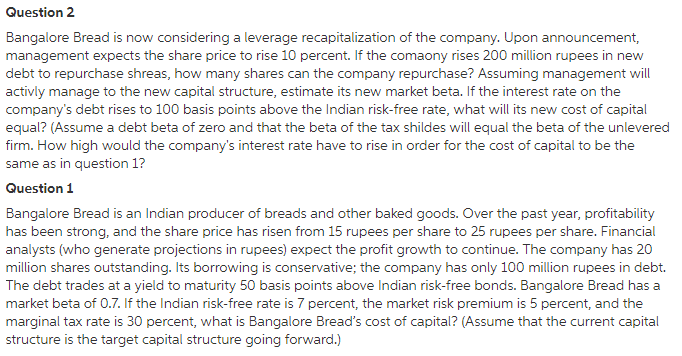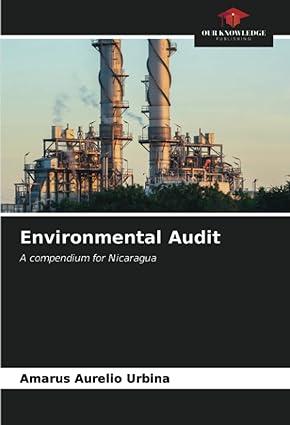Answered step by step
Verified Expert Solution
Question
1 Approved Answer
Main question to be answered is below. Question 1 and 2 are for reference purposes since some data needs to be taken for them: Your

Main question to be answered is below. Question 1 and 2 are for reference purposes since some data needs to be taken for them:
Your company, EuropeCo (a German conglomerate of food, beverages, and consumer products), has announced its intention to purchase Bangalore Bread. EuropeCo has the same target capital structure as that of Bangalore Bread in Question 2. If the German risk-free rate is 5 percent and the beta of EuropeCo is 0.9, what is the cost of capital for Bangalore Bread under EuropeCo control?
Question 2 Bangalore Bread is now considering a leverage recapitalization of the company. Upon announcement, management expects the share price to rise 10 percent. If the comaony rises 200 million rupees in new debt to repurchase shreas, how many shares can the company repurchase? Assuming management will activly manage to the new capital structure, estimate its new market beta. If the interest rate on the company's debt rises to 100 basis points above the Indian risk-free rate, what will its new cost of capital equal? (Assume a debt beta of zero and that the beta of the tax shildes will equal the beta of the unlevered firm. How high would the company's interest rate have to rise in order for the cost of capital to be the same as in question 1? Question 1 Bangalore Bread is an Indian producer of breads and other baked goods. Over the past year, profitability has been strong, and the share price has risen from 15 rupees per share to 25 rupees per share. Financial analysts (who generate projections in rupees) expect the profit growth to continue. The company has 20 million shares outstanding. Its borrowing is conservative; the company has only 100 million rupees in debt. The debt trades at a yield to maturity 50 basis points above Indian risk-free bonds. Bangalore Bread has a market beta of 0.7. If the Indian risk-free rate is 7 percent, the market risk premium is 5 percent, and the marginal tax rate is 30 percent, what is Bangalore Bread's cost of capital? (Assume that the current capital structure is the target capital structure going forward.)Step by Step Solution
There are 3 Steps involved in it
Step: 1

Get Instant Access to Expert-Tailored Solutions
See step-by-step solutions with expert insights and AI powered tools for academic success
Step: 2

Step: 3

Ace Your Homework with AI
Get the answers you need in no time with our AI-driven, step-by-step assistance
Get Started


